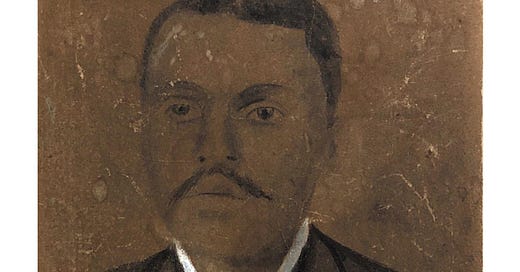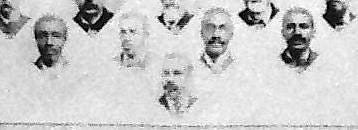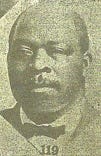More tales of North Carolina's 19th-century African American legislators
Part 3: Members of the 1897 and 1899 sessions of the General Assembly
Earlier this year, I began introducing readers to a handful of African American legislators elected to the North Carolina General Assembly during the nineteenth century, among more than 125 black state legislators, all Republicans, who held office between 1868 and 1900.
This week, I conclude my occasional series on North Carolina’s black public servants during the period, many of whom I have written about in previous articles for the North Carolina Historical Review and in other publications. Today’s post explores the lives of legislators who were first elected to sessions of the General Assembly in 1897 and 1899, the last legislature with black members until 1969:
James H. Arrington (1851-1919?), of Halifax County, served one term in the N. C. House of Representatives, elected from Halifax County as a Republican in 1896. He was born in September 1851, probably to an enslaved mother in Halifax County. Little else is known of his early life or education; he was likely educated in the Halifax County common schools after the Civil War, and became a farmer.
By the 1890s, he had become active in the Halifax County Republican Party, and was a magistrate in Halifax Township, in 1896. That same year, the county party selected him as its nominee for the N. C. House of Representatives. Elected later that year, he served in the 1897 session of the General Assembly. He did not seek reelection in 1898.
After leaving the legislature, Arrington served as a justice of the peace for Halifax County from 1898 to 1900.
Arrington and his wife, Pattie Purnell Arrington, were married about 1875, and had at least seven children: James A., Sarah J., Willie A., Walter B., Ethel M., Casey E., and Rodney. In the 1910 census, four of those children still lived with the Arringtons, the last census in which James Arrington is named. In the 1920 census, Pattie Arrington is described as widowed and living with her son Rodney and other family members.
Arrington’s death date and place of interment are unknown; he is presumed to have died in Halifax County some time before 1920. His widow died in Halifax County in 1926, and is interred in Jesse Hawkins Cemetery, along with at least two of their children.
* * * * * * *
William Calvin Coats (1852-1930), of Seaboard, served one term in the N.C. House of Representatives from Northampton County as a Republican, elected in 1898. He was born on April 15, 1852, in Northampton County, the son of Henry and Nansey Coats. Little is known of his early life or education, but he was apparently educated in the common schools; he became both a minister and schoolteacher.
He worked as a schoolteacher, and became active in the Northampton County Republican Party by the late 1880s. During the 1883 General Assembly, he was nominated for the post of Senate doorkeeper, but was not appointed. In November 1889, he was appointed U.S. postmaster at Seaboard under the administration of President Benjamin Harrison, a post he held until 1893.
William C. Coats of Seaboard (second from left) served in the NCGA session in 1899. Public domain photo
In 1896, he served as a magistrate for Seaboard Township, and may later have served as an interviewer for the N.C. Employment Commission in Charlotte.
In 1898, Northampton Republicans selected him as their nominee for the county's seat in the N.C. House of Representatives. Elected later that year, he served in the 1899 session of the General Assembly. He did not seek reelection in 1900.
Coats was married in 1891 to Willie F. Stewart, who was later appointed postmaster in Seaboard in 1897, during the administration of President William McKinley. Mrs. Coats held the office until 1901. Their daughter Mary was born in March 1897.
In the Northampton County census of 1910, Coats was listed as a widower. In 1912, he married Penelope D. Hamlet, a schoolteacher, who died of tuberculosis in 1922. According to the 1930 census, they now had three teenage sons: Robert, Moses, and Jessie Coats.
He died on December 14, 1930, in Seaboard, and is interred in Seaboard Cemetery, along with his daughter, Mary Coats Capel, who died of influenza in 1918, and her husband.
* * * * * * *
William Henry Crews Jr. (1844?-1912?), of Oxford, served two terms under that name in the N.C. House of Representatives from Granville County as a Republican, elected in 1894 and 1896. Although some sources name him as the separate son of William H. Crews, who served in the 1874-76 and 1893 sessions of the General Assembly, he appears to be the same William Henry Crews, who had previously not used the “Jr.” [There is no record of a son by that name among Crews’s legitimate children by his wife, Sarah Taylor Crews.]
In any event, he was chosen by Granville Republicans in 1894 as their nominee for the county’s seat in the N.C. House of Representatives. Initially unsuccessful in the 1894 election against incumbent Democrat A. A. Lyons, he contested his defeat in that election. He was seated in the 1895 session of the General Assembly on January 24, 1895, after the House voted to oust Lyons and award him the seat. He was then appointed to the House Committees on Propositions and Grievances, Immigration, Public Buildings and Grounds, and Judiciary.
William H. Crews Jr. of Oxford (far left) served in the 1895 and 1897 NCGA session. Public domain photo
Crews was reelected to his seat in 1896, and served in the 1897 session of the General Assembly. He did not seek reelection in 1898.
In the summer of 1896, between legislative sessions, Crews was selected as an alternate delegate from the Fifth Congressional District to the GOP national convention in St. Louis, Missouri, which nominated William McKinley for the U.S. presidency. He appears to have attended the convention to replace another delegate from the Fifth Congressional District, J. H. Holt Jr., who resigned as a delegate in May 1896, weeks before the convention began.
No names or other information are available for Crews’s family, other than those shown elsewhere for William H. Crews.
No death date or place of interment is known for Crews.
* * * * *
Jordan H. Dancy (1871?-1934?, of Tarboro, served one term in the N.C. House of Representatives from Edgecombe County as a Republican, elected in 1896. He was born in September 1871 or 1876 in Edgecombe County, reportedly to Jordan and Edna Dancy, one of at least five children. Little else is known of his early life or education; he likely first attended the common schools of Edgecombe County, and later became a carpenter.
In the 1880 census of Edgecombe County, his family lived on a farm in Lower Conetoe Township. According to family accounts, he later attended college at Shaw University and studied theology at St. Augustine’s College in Raleigh.
Jordan H. Dancy of Tarboro served in NCGA in session of 1897. Illustration courtesy DiscoverEdgecombe.com.
He became active in the Edgecombe County Republican Party in the 1890s. In 1896, county Republicans selected him as their nominee for a county seat in N.C. House of Representatives. Elected later that year, he served in the 1899-1900 sessions of the General Assembly. He did not seek reelection in 1900.
He was described as a day laborer in the 1900 census listing. In 1930, he lists his occupation as house carpenter. According to family records, he helped found Union Baptist Church of Tarboro.
He was married to his wife, Hattie, 27, around 1897, and by 1900, they had two daughters, Matilda, born 1896; Mary, born 1898; and one son Willie, born 1899. Other children were born after 1900, including Jordan Jr., Hattie, Sallie, Glenn, and Alexander.
Dancy’s death date, according to family records, was April 21, 1934. His place of interment are not known. His wife, Hattie, was listed as a widow in the 1940 census.
* * * * * * *
Scotland H. Harris (1869-1953), of Littleton, served one term in the N.C. House of Representatives as a Republican from Halifax County, elected in 1896. He was born in February 1869, the son of Osborne Harris and Ardelia Davis Harris; he was one of at least eight siblings. He was educated in the common schools of Halifax County, and became a schoolteacher.
While teaching in Halifax County, Harris became active in the county's Republican party. In 1896, county Republicans selected him as their nominee for a seat in the N.C. House of Representatives. Elected later that year, he served in the 1897 session of the General Assembly. He did not seek reelection.
Harris married his wife, Mary, who was also a schoolteacher, about 1895. They had at least nine children: daughters Ruth, Helen, Ethel, Mabel, and Catherine, and sons John, Edwin, Herbert, and Scotland E. Harris.
By 1910, the Harris family had moved to Tryon, in North Carolina's Polk County, where Harris worked as an industrial missionary and teacher. According to the U.S. census of 1920, the Harris family was living in Charleston, South Carolina, where he worked as a schoolteacher.
In 1940, after the death of his wife, he again lived in Tryon, N.C., with his daughter Helen and her family. Harris later moved to New Jersey.
Scotland Harris died in New Jersey in July 1953. He is buried in Irvington, located in Essex County, New Jersey.
* * * * * * *
John Thomas Howe (1859-1931?), of Wilmington, served one term in the N.C. House of Representatives from New Hanover County as a Republican, elected in 1896 (or 1897?). Born March 9, 1859, he was the son of a freeman, Alfred Howe, and Mary Moore Walker. Little is known about his early life; he was presumably educated at least in the common schools, and became a schoolteacher.
In the early 1880s, Howe became active in the New Hanover County Republican Party, serving both as city alderman in Wilmington and county commissioner. He was appointed as director of Freedmen’s Savings Bank, Wilmington, and was reportedly an unsuccessful candidate for the GOP nomination for lieutenant governor in 1884. In 1889, he was listed as a schoolteacher in Wilmington, and later as a magistrate in Wilmington Township in 1896.
Appointed as a mail carrier in Wilmington in the mid-1880s, Howe became editor of the Wilmington Weekly Observer in 1892. He was considered for appointment as U.S. collector of customs for Wilmington in 1897, but lost that patronage post to John Dancy.
In 1896, New Hanover Republicans selected him as a nominee for a county seat in the N.C. House of Representatives. After his election, he served in the 1897 session of the General Assembly. He did not seek reelection.
After leaving the legislature, Howe was appointed in late 1899 to a staff position in the office of the Recorder of Deeds for the District of Columbia by Recorder Henry P. Cheatham, according to a news item in that city’s Colored American (December 16, 1899).
In the 1910 census, he was employed in Washington as a copyist-clerk for the U.S. Treasury Department, where he continued to work in 1920. He remained in Washington until his death in 1930.
Howe was married in June 1886 to Aurelia L. Davis. They had one son, Alfred G. Howe.
Howe died on January 20, 1930, in Washington, D.C. He was interred in that city’s old Harmony Cemetery, since relocated to National Harmony Cemetery in Hyattsville, Maryland. His widow died in Chicago, Illinois, in April 1937.
* * * * * * *
William Lee Person (1861-1921?), of Rocky Mount, served one term in the N.C. Senate from 5th District (Edgecombe County) as a Republican, elected in 1896. He was born in June 1861, probably in Edgecombe County to an enslaved mother. Little else is known of his early life; he was likely educated in the county’s common schools.
He became active in the Edgecombe County Republican Party in the 1880s, and was an early leader; in 1882, he served as chairman of the Edgecombe County GOP convention. He also became a strong supporter of Henry Cheatham, in his first campaign for the U.S. Congress from the Second District in 1888. In 1890, he was appointed at Cheatham’s request as U.S. postmaster of Rocky Mount—after two previous nominations had ended badly—during the administration of President Benjamin Harrison. He held that post until 1893.
In 1892 and 1894, he was an unsuccessful internal party candidate for a county seat in the N.C. House of Representatives. In 1896, the county’s Republicans chose him as their nominee for the Fifth District (Edgecombe County) seat in the N.C. Senate. Elected later that year, he served in the 1897 session of the General Assembly.
In early 1897, he accompanied newly-elected Second District congressman George Henry White of Tarboro on White’s March 31 visit to the White House to meet President William McKinley. He continued maneuvering for a patronage appointment in the McKinley administration. By late 1899, Person appears to have been appointed to a staff position in the Government Printing Office in Washington, D.C., according to a news item in that city’s Colored American (December 16, 1899).
How long he held this position or remained in Washington is not clear. By June 1900, when the U.S. census was taken in Rocky Mount, he was listed as living there, with his occupation described as “messenger, census board.” In the census listings of 1910 and 1920, he and his family continued to reside in Rocky Mount; his occupation was listed as “insurance agent.”
He was married in January 1890 to Rena Janet Capps of Wayne County; their children were Russell (b. 1892), John (b. 1894), Hellen (b. 1897), and Marguerite (b. 1902).
In the census of 1930, Rena Person was now listed as married head of household in Rocky Mount, a practical nurse, and living with her two daughters; there is no mention of her husband.
Person’s death date and place of interment are unknown. He is presumed to have died in Rocky Mount sometime after 1920, and may be buried in that city’s long-abandoned Unity Cemetery, where records are incomplete. His wife, Rena Person, died in Rocky Mount in January 1936, and is presumably also buried in Rocky Mount.
* * * * * *
Isaac Hughes Smith (1852-1915), of New Bern, served one term in the N.C. House of Representatives from Craven County as a Republican, elected in 1898. He was born on May 5, 1852, in North Carolina, to Thomas H. Smith and Harriet Merritt Smith. His background is obscure and status unknown. He reportedly gained his early education from a generous white family, and then attended Saint Augustine’s College in Raleigh.
By the 1870s, he had begun teaching school and buying/selling property in Craven County. In the 1880 census of Craven County, he was listed as a schoolteacher in New Bern, sharing accommodations with another male teacher. He soon began selling insurance, and eventually owned so much property that his end of town was called “Smithtown.”
He also became active in the Craven County Republican Party, which nominated him for a county seat in the N.C. House of Representatives in 1898. After his election later that year, he served in the 1899-1900 sessions of the General Assembly. Smith was, however, expelled from the Republican Party for voting and cooperating with Democrats during the legislative session in 1899, and did not seek reelection.
Isaac Hughes Smith of New Bern served in the 1899-1900 session of the NCGA. Public domain photo
A successful banker, businessman, and real estate investor, he was also a partner in Concord’s Coleman Manufacturing Company. He also achieved status as a high-ranking officer in the Masonic Order. At his death, Smith’s estate was valued at $110,000 (including $100,000 in real estate); he left much money to black educational, religious, and fraternal organizations.
Smith was married twice. His first wife was Visey Dudley Smith of Craven County, whom he married in 1875; they had one son, Livingston Smith. After her death, he married Caroline (Carrie) Marie Rhone (1872-1962) in 1898. He had at least six more children: sons Isaac Jr., Thomas, and Arnold, and daughters Caroline, Henrietta, and Harriet.
Smith died in New Bern on July 6, 1915. He is buried in that city’s Greenwood Cemetery, along with his widow and several of his children and other relatives.
Next time: Finding the pioneers in my family’s background







